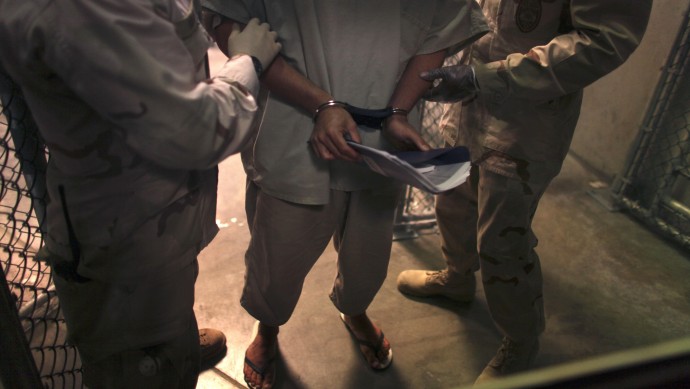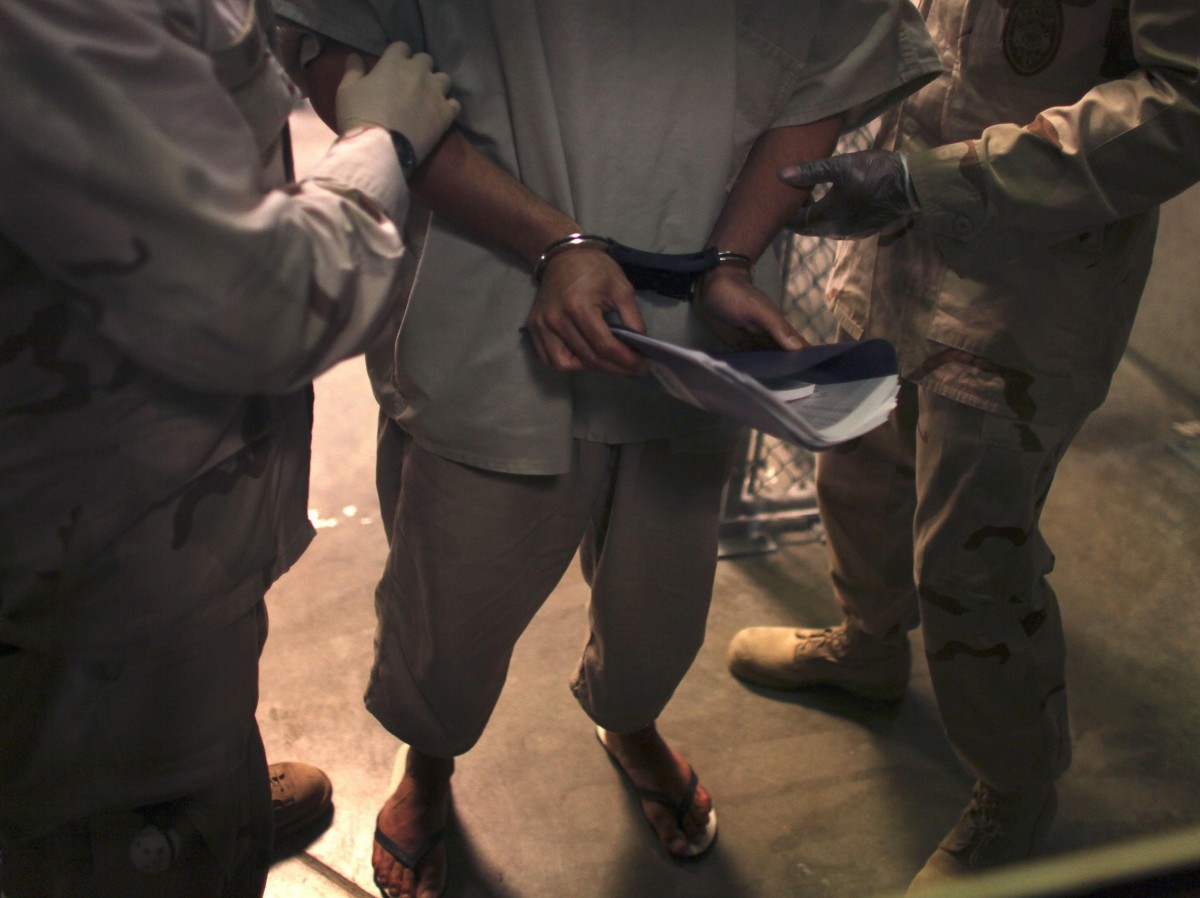
WASHINGTON – The Pentagon made two long-awaited announcements this week toward an eventual closure of the detention center at Guantanamo Bay, Cuba, underlining a mounting seriousness over President Barack Obama’s repeated promises to shutter the facility.
On Tuesday, Defense Secretary Chuck Hagel appointed a special envoy to oversee this work, filling a key position that has remained vacant since the president announced its creation in May. Paul Lewis, a former U.S. Marine and longtime congressional lawyer, will now join a counterpart envoy at the State Department, Clifford Sloan (appointed in June), on both the Guantanamo closure and figuring out what to do with foreign prisoners in Afghanistan as the U.S. military withdraws there.
Then on Wednesday, the Pentagon confirmed for the first time that a formal process is now underway to determine which, if any, of those being “indefinitely detained” at Guantanamo could be released. The Pentagon says that the cases of some 71 men will eventually be examined under the new process, known as the Periodic Review Board (PRB) – again, a procedure that was mandated by an executive order back in 2011.
Rights advocates have welcomed both moves, despite their lateness.
“We are delighted that the president has followed up with these crucial announcements,” Hans Hogrefe, Washington director of Physicians for Human Rights, an advocacy group that has regularly criticized some Guantanamo practices, told Mint Press News.
“Lewis has significant experience on Capitol Hill, and I hope this background will fill the existing gap between President Obama’s intention to close Guantanamo and the legislative hurdles that exist in making those intentions come true. Lewis has the experience to do that, but he will need the full support of the administration.”
On Monday, Physicians for Human Rights and 17 other watchdog and civil society organizations wrote a letter to President Obama urging action on both the overdue appointment of a special envoy and on the removal of detainees who have been cleared for transfer. “These actions,” the groups wrote, “would help to fulfill your renewed promise to end indefinite detention and close the Guantanamo prison.”
President Obama made that renewed pledge in May at a major security speech here in Washington, three months after several dozen Guantanamo detainees undertook mass hunger strikes to protest their indefinite detention. The strikers were thereafter subject to forcible feeding procedures by U.S. doctors and nurses, a process widely denounced, including by Physicians for Human Rights. While nearly all of these strikes have since been called off, as of Wednesday, 17 detainees were reportedly still on hunger strike, though none were being hospitalized.
Continuing threat?
The Guantanamo Bay detention center, created as a key part of President George W. Bush’s “war on terror,” today houses 164 people. Of those, 84 detainees have reportedly been cleared for transfer to their home countries or to third countries, including 26 from Yemen alone.
But U.S. officials have been alternately spooked and confused about what to do with many of those who have been cleared, worried that detainees sent home could either be targeted or take up arms against the United States. In addition, the Obama administration has yet to prioritize striking agreements with third countries to take in some of the released detainees, despite precedent for such agreements in the past.
In that legal limbo, however, these and some other detainees are seen as being held indefinitely, a situation that the United Nations has said “raises serious concerns under international law.” The Periodic Review Board, which requires regular paper and in-person reviews of each detainee’s case every six months and three years, respectively, will now offer a formal mechanism by which to move forward.
“The PRB process makes an important contribution toward the administration’s goal of closing Guantanamo Bay by ensuring a principled and sustainable process for reviewing and revisiting prior detention determinations in light of the current circumstances and intelligence, and identifying whether additional detainees may be designated for transfer,” the Pentagon said Wednesday.
“The department remains committed to responsibly reducing the detainee population and ultimately closing the detention facility at Guantanamo Bay.”
The PRB will constitute an interagency review, unlike previous such processes administered solely by the Pentagon. Cases will be reviewed by representatives from the Defense, Homeland Security, Justice and State Departments, as well as the Office of the Director of National Intelligence and the Joint Staff (the leadership of the four arms of the military).
While these officials will not be tasked with exploring the legality of the continued detention of individual detainees, they will whether each detainee poses a “continuing significant threat” to the United States. While officials will have access to a broad swath of information on detainees’ history, health and related analysis, they will not be able to rely on any information obtained through torture or degrading treatment.
Detainees, meanwhile, will be given access to their own private counsel, and will also have the opportunity to bring in witnesses.
“A lot of people have been sitting in that prison for 10 years, and many cases haven’t been reviewed for many years – many of those people no longer present a danger to the U.S.,” Daphne Eviatar, a senior counsel with the Law and Security Program at Human Rights First, a legal aid group, told Mint Press News.
“Now we just need to see how fast these cases move along and whether they give the detainees reasonable access to attorneys. Up until this point, of course, many lawyers have experienced all sorts of obstacles that have made it extremely difficult to actually represent their clients.”
Conservative suspicion
While the PRB process has now formally begun, it has yet to actually take up its first case, and the Pentagon has offered no public timeframe on what to expect from this process.
Indeed, in the eyes of many, of course, all of this is taking place very – even inhumanely – late. President Obama famously came to office in 2009 pledging to close the Guantanamo Bay detention center as quickly as possible.
Politics have tied the president’s hands, at least in part, with the U.S. Congress having legally barred the transfer of Yemeni prisoners, for instance, among other legislative restrictions. But critics have long held that the president has always had the authority to unilaterally force these and other transfers.
Still, U.S. public opinion on the issue has remained complicated, even seeing a hardening in opposition to closing Guantanamo over the course of President Obama’s time in office. According to polling by the Pew Research Center, some 39 percent of Americans approved of a plan to close Guantanamo in 2009, compared with just 24 percent in 2012.
During both years, conservatives were far more likely to disapprove of any plan to shutter the facility. Indeed, just this week Republican lawmakers renewed attacks on President Obama’s moves to speed up the process of closing Guantanamo, suggesting he was prioritizing politics over national security.
Those tensions rose over the president’s suggestion that Anas al-Libi, the al-Qaeda leader captured this weekend in Libya wanted for his alleged involvement in the bombings of two U.S. embassies, would be put on trial in the United States, rather than being sent for interrogation at Guantanamo Bay. According to reports, al-Libi is currently being held on a U.S. Navy boat in the Mediterranean.
On Tuesday, three Republican senators – Lindsey Graham, Saxby Chambliss and Kelly Ayotte – said they would begin work on a Senate resolution that would disallow the president from closing the Guantanamo detention center.
No logical support
Still, many see the movement towards the facility’s closure as increasingly inevitable.
“I doubt there would much support for making it impossible to close this prison – there’s just no logic behind doing so,” Human Rights First’s Eviatar says.
“This facility already holds a very small number of detainees, and the costs of maintaining it are astronomical. Further, Guantanamo was designed to hold detainees during an armed conflict, but as the U.S. withdraws troops from Afghanistan by 2014 it will be difficult to maintain the idea that we’re involved in an armed conflict.”
That means there would be no legal basis for keeping open the offshore prison.
With the review now begun, Eviatar says the entire PRB process should take less than a year. During that process, she says she will be looking at two primary issues.
“First, is the board going to actually determine that some of these detainees can be released or transferred, and will we learn about that?” she says. “And second, will any aspect of this process be public or open to media or NGOs? Currently, there is just no way to know if these hearings are fair and meeting minimum levels of due process.”
The Pentagon says that it will be putting up a website through which it will share unclassified information related to the hearings, as well as “milestones” and results of the hearings. It notes this website is currently being developed, however, and is only “projected to become operational later.”


